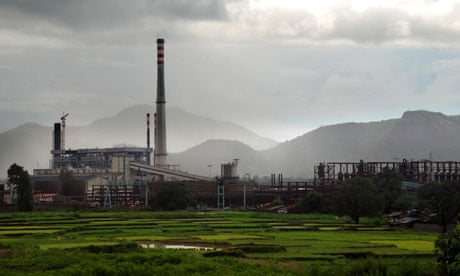The result of India's first environment referendum is known. A dozen Dongria Kondh village councils in the eastern state of Odisha have rejected proposals by Vedanta Resources, the London Stock Exchange-listed mining company, to quarry the bauxite-rich Niyamgiri hills. The councils, or gram sabhas, cite gross violation of their religious and cultural rights.
The tussle over the Niyamgiri hills between Vedanta, an $11.4bn multinational, and the 8,000-strong Dongria Kondh community has spanned a decade. The Kondhs, who live in the forests, believe the mountain range is sacred and that their god, Niyam Raja, provides them with food, water and a way of life.
"We get almost everything from the mountain," says Kutia Majhi, president of the resistance group Niyamgiri Suraksha Samiti (the Save Niyamgiri Foundation). "All we need from the government is salt, kerosene. The government should spare our culture."
On 18 April, India's supreme Court asked the Odisha government to garner opinion from villages potentially impacted by Vedanta's plans. In its order, the court interpreted the rights and power of tribal peoples and forest dwellers under the Forest Rights Act of 2006, the constitutional provisions specific to them, holding that their religious and cultural rights must be protected.
Vedanta is involved in a joint venture with the Odisha Mining Corporation Ltd (OMCL), a state-owned company, to develop a bauxite mine in the Niyamgiri hills and supply material to Vedanta's nearby alumina refinery. The OMCL, in consultation with Vedanta, chose the 12 villages in Rayagada and Kalahandi districts for the referendum process.
Vedanta is keen to mine Niyamgiri and refine the bauxite locally because that will make it one of the most economical operations in the global aluminium industry. Odisha has rich bauxite deposits: an estimated 2,000m tonnes, two-thirds of India's total deposit. Vast tracts of India's mineral wealth lie in tribal areas, but indigeneous people complain they rarely reap any benefit.
Odisha will now submit the the village council resolutions to the ministry of environment and forests (MoEF); the fate of the project will be clear by mid-October. Analysts say the ministry may seek legal opinion from the ministry of tribal affairs, which felt all 100 villages affected by the project should have been consulted rather than just a dozen. Officials fear the 12 villages could be influenced later by Vedanta and the Odisha government.
Meanwhile, Odisha officials are devising a strategy to supply bauxite to Vedanta from the OMCL reserve. Pinaki Misra, an MP for the BJD, the ruling party in Odisha, told the TV channel NDTV that his party is committed to providing Vedanta with bauxite.
"The referendum is a positive move and follows the United Nations principle of free, prior and informed consent," says Ravi Rebbapragada, secretary general of Mines, Minerals and People, an alliance of individuals, institutions and communities concerned about, and affected by, mining. "India is a democracy, and so we demand that such referendums should also be held in other mining-affected areas of the country."
"India has an unsustainable density of NGOs and the movement is instigated by them. These NGOs are stalling the country's development," says RK Sharma, secretary general of Federation of Indian Mineral Industries (FIMI), who believes political competition for the tribal vote is also partly to blame for the Vedanta controversy. Sharma has questioned the desire of western countries that support NGOs working in India to support the growth of India's aluminium industry.
In February 2000, the Union government approved 100% foreign direct investment in the mining sector, but investments have been negligible. "This is because of the NGOs as well as inactivity on the part of the states," says Sharma. According to FIMI, there are 64,565 applications pending with state governments for prospecting licences and mining leases.
The Vedanta case has attracted international attention. After the 12-0 verdict, Survival International, which campaigns for the rights of tribal people, said: "Vedanta's experience should serve as an important lesson for companies intent on extracting resources from tribal peoples' lands: they must seek the communities' free, prior and informed consent and not proceed without it."
At a public meeting held in New Delhi on 31 July, social activists, including writer Arundhati Roy, demanded that Vedanta demolish its refineries near the Niyamgiri hills and compensate local people.
In 2010, the Church of England sold its Vedanta shares on ethical grounds, while in 2009 the FTSE 100 company was rebuked by the British government for failing to respect the human rights of the tribe.
It has been suggested that the Na'vi, the indigenous race whose land is threatened by the activities of a powerful mining organisation in James Cameron's movie Avatar, were based on the Kondhs.
After the referendum verdict, an ecstatic Lodu Sikaka, Dongria leader, said: "Our god lives in open space, you keep your God locked up with a key. We won't leave Niyamgiri. If the government and politicians ask for it, we will fight."



Comments (…)
Sign in or create your Guardian account to join the discussion